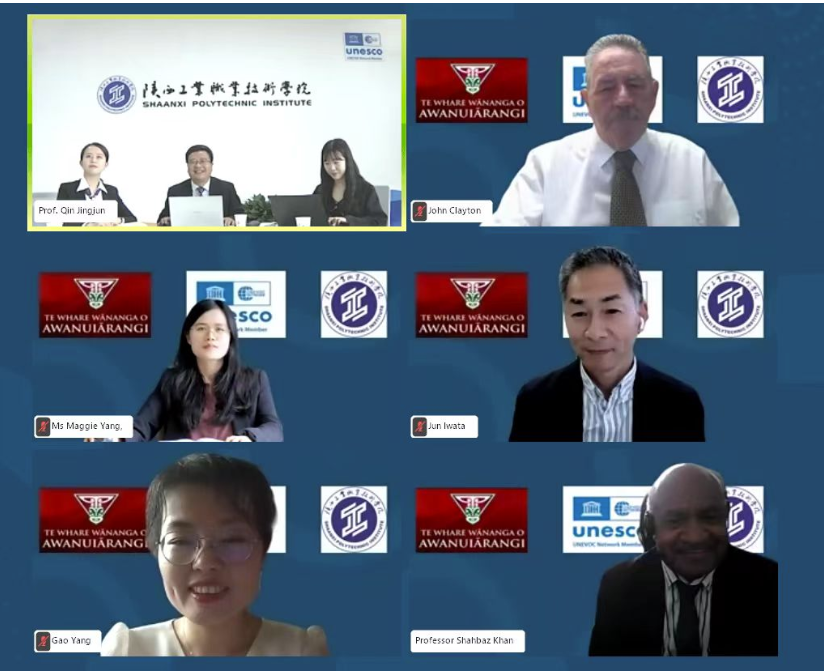
为探讨职业教育如何融入全球公民教育要素,树立职业教育国际新理念,培养适应时代需要,具备全球素养的技术技能人才,5月23日至24日,设立于陕西工业职业技术学院的联合国教科文组织职教联系中心与新西兰毛利大学联合主办了职业教育与全球素养人才培养工作坊,活动以视频会议的形式举行。联合国教科文组织东亚多部门地区办事处主任夏泽翰教授、教育项目官员裴伯庸先生、联合国教科文组织国际职业教育与培训中心负责人Friedrich Huebler博士、新西兰驻华大使馆教育参赞张典先生分别以录制视频的形式向活动致辞、作报告。来自近19个国家和地区的70余名职教人才参加了活动。活动由陕西工业职业技术学院国际教育学院院长秦景俊主持。
活动围绕推动职业教育落实2030教育行动框架,适应产业变革和全球化发展,加快培养具备全球素养的技术技能人才,邀请教科文亚太经合组织、韩国职业教育与培训研究所、埃及哈勒旺大学、日本岛根医科大学、新西兰毛利大学、香港都会大学、天津城市职业技术学院和陕西工业职业技术学院的职教专家做主旨发言。活动从职教政策、理论研究、院校实践等维度交流研讨了当前职业教育开展全球公民教育,培养具备全球素养技术技能人才的实践路径、取得的成绩和面临的挑战。
与会专家和代表认为,全球公民教育对促进人的全面发展,促进经济社会发展和构建人类命运共同体具有十分重要的作用。全球职业教育机构应结合国情、校情、学情,不断更新教育教学理念,加强教学资源建设,丰富教学手段,将全球公民教育融入教育教学全过程。
联合国教科文组织职教联系中心网络和联合国教科文组织职业技术培训与教育全球战略将继续发挥引领和指导作用,促进国际和地区间职业教育交流互鉴,助力成员国的职业教育系统与时俱进,进一步提升职业教育的质量。
Promoting Quality TVET by Incorporating a Global Citizenship Approach into TVET Programmes
On 23 – 24 May 2023, a virtual international workshop was organized under the theme Incorporating a Global Citizenship Education (GCED) Approach into TVET Learning Environments was hosted by the UNEVOC Centre at Shaanxi Polytechnic Institute (SXPI), with technical support from UNESCO Multisectoral Regional Office for East Asia (hereafter UNESCO Beijing), the UNEVOC International Centre, and Te Whare Wananga o Awanuiārangi Institute in New Zealand.
A total of 259 participants engaged actively in the workshop. Participants included TVET practitioners, researchers, TVET students and experts from academia and the field of TVET, policy makers and leaders from 19 countries, UNESCO Multi-sectoral Regional Office, UNESCO Category II Asia-Pacific Centre of Education for International Understanding (APCEIU), Korea Research Institute for Vocational Education and Training (KRIVET), Regional Cluster Coordinator for UNEVOC Network.
The interface between GCED and TVET was highlighted in the various presentations of the workshop in the context of increased international mobility of TVET graduates across the globe. It is vital to equip the TVET students with the global values and respect for cultural diversity. This workshop was organized with a particular focus on GCED integration in TVET programmes. The workshop was the first international workshop organized by Shaanxi Polytechnic Institute since it was designated as the UNEVOC Centre in 2022. As a new member in the UNEVOC Global Network, Shaanxi Polytechnic Institute has since been actively promoted an inclusive TVET agenda aligned with the UNESCO Global Strategy for TVET (2022-2029).
One significant challenge faced by TVET systems and institutions is to comprehensively incorporate GCED into the TVET curricula and institutional programmes. In this regard, the main objective of the workshop was to build insights, share best practices and exchange ideas on how to better integrate GCED into TVET systems and programmes. They shared case studies of GCED being implemented in Hong Kong Metropolitan University, Korea Research Institute for Vocational Education and Training of the UNEVOC Network, Shimane Medical University and Shaanxi Polytechnic Institute.
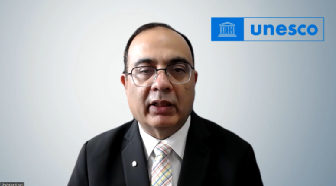
Prof. Shahbaz Khan delivering his opening remarks
In his opening remarks, Prof. Shahbaz Khan, Director of UNESCO Beijing Office, highlighted the strategic partnership and cooperation with UNEVOC Centre at Shaanxi Polytechnic Institute. He expressed his appreciation to Shaanxi Polytechnic Institute, the UNEVOC International Centre in Bonn, and Te Whare Wananga o Awanuiārangi Institute in New Zealand for jointly organizing this successful workshop.
In view of the current era of globalization, Prof. Khan emphasized the need to instill in learners values and behaviors that are aligned with global citizenship, peace, prosperity, and sustainable development. By combining technical skills as demanded by the Fourth Industrial Revolution and the soft skills provided by GCED, TVET graduates can be well-equipped to meet the challenges of globalization, fast-changing labor market, green skills, digitalization and automation.
Dr. Friedrich Huebler delivering his remarks
Dr. Friedrich Huebler, Head of UNEVOC International Centre for TVET in Bonn, highlighted the close alignment between the role played by GCED in TVET with the three main lines of action proposed by the UNESCO Strategy for TVET (2022-2029). The new UNESCO Strategy for TVET puts forward the need to “Develop skills for individuals to learn, work and live”, to “Develop skills for inclusive and sustainable economies” and “Develop skills for inclusive and peaceful societies”. By prioritizing GCED and cultural awareness, TVET institutions become places for social integration and cohesion, and contribute to the creation of a more peaceful tolerant world.
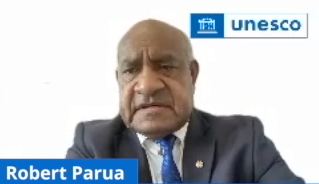
Mr. Robert Parua delivering his presentation
Mr. Robert Parua, Education Programme Specialist of UNESCO Beijing Office, presented an overview of the UNESCO’s GCED programme and acknowledged UNESCO’s important mission to nurture GCED programs at all levels of the education systems, including the academic institutions. There is a huge gap to integrate GCED in TVET programmes and the importance of hosting such a relevant workshop. He highlighted the key SDG4 target 4.3 and 4.7 related to TVET and GCED. Fostering quality TVET systems entails a significant potential for change, it could contribute towards the transformation of the educational landscape and equip learners with the values and skills required in their professional careers in many regions and countries.
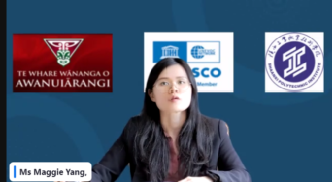
Ms. Maggie Yang delivering her presentation
Ms. Maggie Yang, Programme Specialist of the External Relations and Information Office at the Asia-Pacific Centre of Education for International Understanding (APCEIU), presented the possibility of using virtual workshop spaces as tools to raise awareness and facilitate the incorporation of GCED into TVET learning environment. Ms. Yang underlined the importance of research and development, partnership creation and networking as pivotal areas for strengthening GCED in TVET. She highlighted the critical role played by APCEIU in strategic partnership with UNESCO to promote GCED through policy dialogue, capacity development, sharing good practices with UNESCO Member States in all regions.
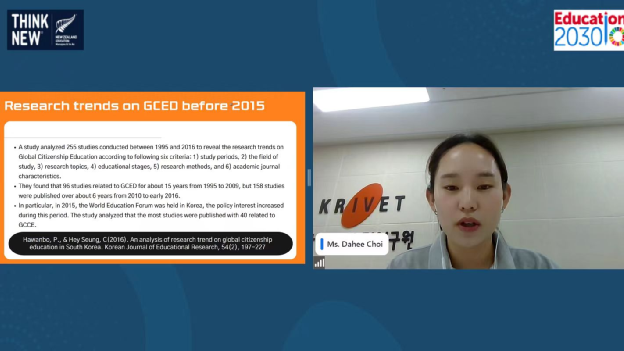
Ms. Dahee Choi delivering her presentation
Ms. Dahee Choi, Research Associate, Center for International Cooperation, Korea Research Institute for Vocational Education and Training (KRIVET), shared key highlights of the case study on the implementation of Global Citizenship Education in ROK at the Seminar.
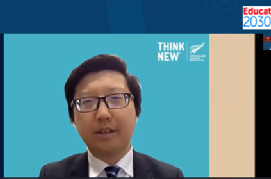
Prof. Michael Zhang delivering his presentation
Prof. Michael Zhang, Regional Director of Greater China for Education New Zealand (ENZ), who once served as Acting Consul-General in Guangzhou and Deputy Consul-General in Chengdu, emphasized on the relevance of dialogue between institutions and stakeholders to identify best solutions for learners. Enhancing skills with GCED will certainly be conducive towards building a more sustainable economy and peaceful society.
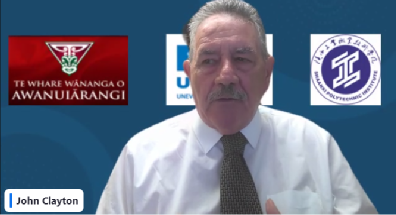
Prof. John Clayton delivering his presentation
Prof. John Clayton, from Te Whare Wānanga o Awanuiārangi Institute, facilitated workshop session on educational theories and frameworks, including the Transformative Learning Theory and the Cognitive Load Theory. TVET educators were provided with fundamental tools to construct learning environments that encourage learners to validate their cultural identity. By acknowledging their identity, about who they are, where they come from and what factors influence their engagement, learners will attain a positive mindset of validation and success.
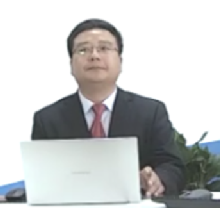
Prof. Qin Jingjun delivering his speech
Prof. Qin Jingjun, Head of UNEVOC Centre at Shaanxi Polytechnic Institute and Dean of the International Education School of Shaanxi Polytechnic Institute, shared the experiences and projects implemented by Shaanxi Polytechnic Institute, as a model of implementation in China. In his closing remarks, Prof. Qin stated how the incorporation of GCED into TVET will act as a catalyst for innovation, economic growth, and social development, providing individuals with the necessary skills to thrive in an ever-changing world.
Prof. John Clayton, emphasized the need for TVET practitioners, who engage directly with learners, to reflect on their current teaching practices and embrace new approaches to sustainable education. Mr. Robert Parua on behalf of UNESCO thanked the Shaanxi Polytechnic Institute, Te Whare Wananga o Awanuiārangi Institute, and the UNEVOC International Centre in Bonn, Germany, to jointly organize the fruitful workshop with positive outcome. The workshop is a good model for collaboration among UNEVOC Centres within the region.
The valuable presentations shared by experts at the workshop will further reinforce the development and integration of Global Citizenship Education into TVET systems that empower and instill individuals with soft skills and global values in peace, respect for diversity and tolerance, and contribute towards building a resilient to contribute towards building inclusive sustainable development.
For more information:
UNESCO Strategy for TVET 2022-2029
https://unesdoc.unesco.org/ark:/48223/pf0000383360
UNESCO Skills for work and life
https://www.unesco.org/en/skills-work-life
UNESCO Global Citizenship Education (GCED)
https://en.unesco.org/themes/gced
Asia-Pacific Centre of Education for International Understanding (APCEIU) under the auspices of UNESCO
http://www.unescoapceiu.org/



